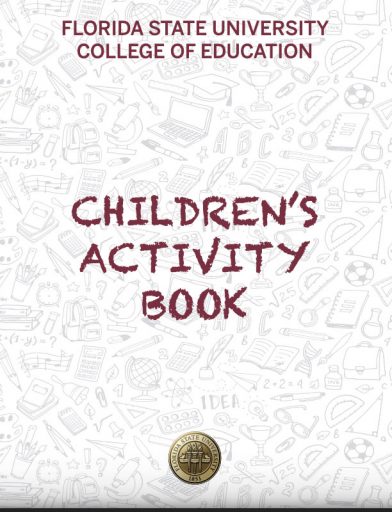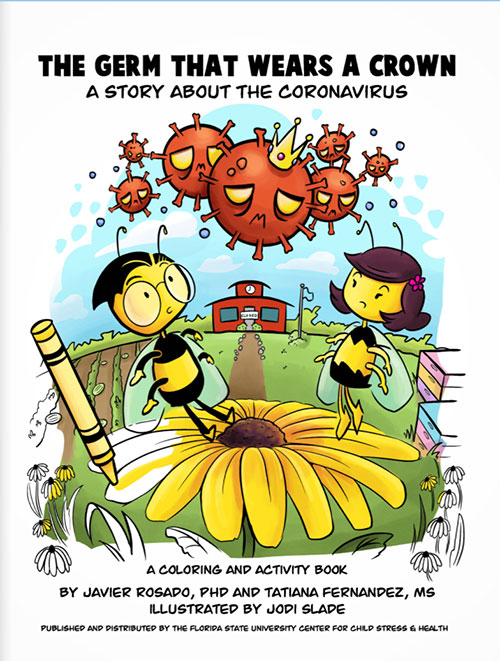 As millions of moms and dads in COVID-19’s stay-at-home Florida wonder what to do next, Florida State University education experts are offering resources to help parents-turned-teaching-assistants make good choices.
As millions of moms and dads in COVID-19’s stay-at-home Florida wonder what to do next, Florida State University education experts are offering resources to help parents-turned-teaching-assistants make good choices.
With activity books loaded with educational bits, videos and guides on reading instruction and a massive database of tested teaching resources, FSU has plenty that parents can put to use over their kitchen tables.
A coloring book, produced by the College of Education with help from University Communications, is free for parents to download and print out. It includes a variety of educational activities, including math and word games, designed to engage young children. Each activity has an FSU theme and facts about the university.
“The idea for the activity book actually came from a discussion I had with a Florida State University alumna from the Class of 1964,” said Damon Andrew, dean of the College of Education. “She recalled completing a Florida history activity book in her youth, and she noted the activities associated with FSU in that book sparked a dream to attend FSU later in life.”
Developing the coloring book and activities, such as word games and a maze, are part of the college’s mission to meet the needs of students, educators and parents and to foster education as a career.
“We believe in education as a public good, and we are committed to providing services and outreach to our community however we can,” Andrew said. “We are constantly seeking innovative ways to connect with the next generation of students and promote the teaching profession as a way to make a lasting, positive impact.”
 A second activity book developed by the Center for Child Stress and Health, a part of the College of Medicine’s Immokalee Health Education Site, educates children about COVID-19. It’s intended to help parents speak with young children about the virus and to give children tips on how to cope with all of the changes brought on by the outbreak.
A second activity book developed by the Center for Child Stress and Health, a part of the College of Medicine’s Immokalee Health Education Site, educates children about COVID-19. It’s intended to help parents speak with young children about the virus and to give children tips on how to cope with all of the changes brought on by the outbreak.
Javier I. Rosado, the center’s clinical director and one of the book’s authors, said the book follows the story of two friends as they learn about the virus, how it spreads and what people can do to keep themselves safe.
The book, available to download for free at fsustress.org/ebook.html, includes black-and-white drawings that kids can color and activities that invite them to share how they’re feeling and to think about how they can have fun even while they must stay home.
With children at home, a big concern for parents is reading. How do you get students started in the right way, and how do you keep developing their skills? Researchers at FSU’s Regional Educational Laboratory Southeast can help.
The FSU experts have posted how-to-teach-reading videos for parents to use, along with easy-to-follow guides that explain key points of reading instruction.

“We’re developing teachers’ guides to support family involvement in foundational reading skills,” said Marcia Kosanovich, senior research associate with the lab, which is supported by the U.S. Department of Education. “These Family Literacy Videos and guides were originally meant to support kindergarten through third-grade teachers and to show them how, using family-friendly language, they can help families. But now, with everyone having to work with their children at home, we decided to pull out those videos and those activities and make a parents’ page.”
Parents can watch the Family Literacy Videos and access the teaching guides at https://ies.ed.gov/ncee/edlabs/regions/southeast/foundations/kindergarten_intro.asp.
The researchers have posted videos and guides for kindergarten and first-grade students and soon will post others for second-grade and third-grade students, too.
“It’s a very user-friendly web page for parents,” Kosanovich said. “It’s to help parents know what to do with reading with their child at home.”
The videos and guides are easy to follow and offer a lot of gentle guidance for parents, who may be nervous to suddenly find themselves playing an enlarged role in reading instruction now that classrooms are shut down.
The reading lab’s resources focus on essentials. The guides, for example, cover high-frequency words, the “the, was, very, up” and other common words of a young reader’s life. The videos and guides show parents how to help their children learn to read high-frequency words automatically.
Challenging and important words may turn up in a child’s reading, too, and they are important to know. Tyrannosaurus rex, for example, is a very challenging word for a young reader but an essential part of any child’s vocabulary. A video and guide help parents teach children how to decipher these big words. Other videos address additional key points in reading and learning.
The videos and teaching guides were developed by Kosanovich, working with fellow FSU researchers Laurie Lee and Barbara Foorman, under support from the U.S. Department of Education’s Institute of Education Sciences.
The guides were developed to help parents and children enjoy development of reading skills.
“Just be encouraging and have fun with your kids,” Kosanovich said. “We don’t want it to be a high-pressure type of thing. We want them to just enjoy reading with each other.”
There are, of course, many other challenges today’s parent-educators face, including finding resources for students of other ages. FSU again is ready to help through its comprehensive CPALMS digital toolbox of educational resources. Each has been tested by a team of educators and aligned with Florida’s teaching standards.

“Our major effort is supporting teachers, parents and students during this phase of teaching and learning from home,” said Rabieh Razzouk, director of FSU’s Florida Center for Research in Science, Technology, Engineering and Mathematics (FCR–STEM) and the creator of CPALMS. “We are doing this by providing free access to CPALMS, which includes 13,000 high-quality instructional resources for teachers that are also available to parents.”
Among the materials there are thousands of full lessons, videos and interactive resources.
“The CPALMS teaching resources are all complete and created for the novice teacher in mind,” Razzouk said. “Now that every parent has to wear the teacher’s hat, the level of detail we provide comes in handy.”
Students may access many CPALMS materials directly. CPALMS has more than 3,000 educational resources for students including more than 1,500 Original Student Tutorials (interactive lessons) and CPALMS Perspectives videos. All are designed to be used directly by students, and they work on computers, tablets and smartphones.
Parents and students are taking advantage. CPALMS, always one of the most popular websites in education, has seen a greater than tenfold increase in traffic in recent weeks.
“We opened up all our resources to be freely accessible by anyone from anywhere during these difficult times,” Razzouk said. “Now a parent has access to all teacher materials and all students have access to all student resources. We modified our homepage to help users find what they need, and I am also doing user support to expand our hours to nights and weekends. We are always available to help.”
- Links to Resources
College of Education’s activity book - Center for Child Stress and Health activity book
- Reading Education Laboratory Southeast’s reading-instruction guides
- FCR-STEM’s CPALMS public area
- FCR-STEM’s CPALMS student area




